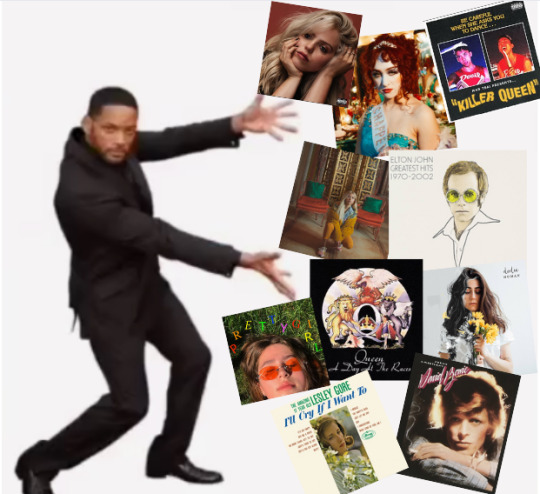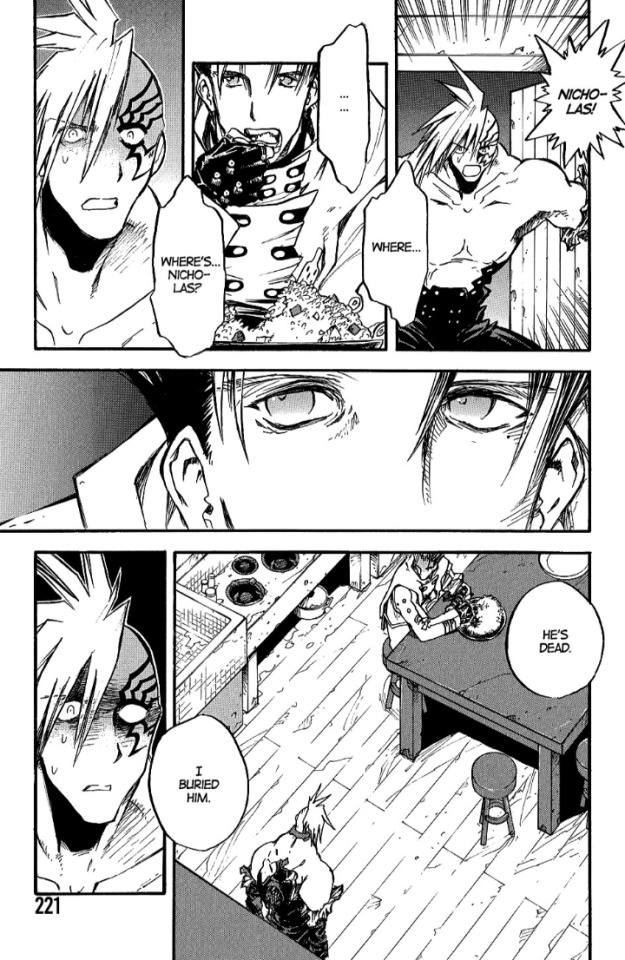#Mad Pops
Text
As I keep shouting into the void, pathologizers love shifting discussion about material conditions into discussion about emotional states.
I rant approximately once a week about how the brain maturity myth transmuted “Young adults are too poor to move out of their parents’ homes or have children of their own” into “Young adults are too emotionally and neurologically immature to move out of their parents’ homes or have children of their own.”
I’ve also talked about the misuse of “enabling” and “trauma” and “dopamine” .
And this is a pattern – people coin terms and concepts to describe material problems, and pathologization culture shifts them to be about problems in the brain or psyche of the person experiencing them. Now we’re talking about neurochemicals, frontal lobes, and self-esteem instead of talking about wages, wealth distribution, and civil rights. Now we can say that poor, oppressed, and exploited people are suffering from a neurological/emotional defect that makes them not know what’s best for themselves, so they don’t need or deserve rights or money.
Here are some terms that have been so horribly misused by mental health culture that we’ve almost entirely forgotten that they were originally materialist critiques.
Codependency
What it originally referred to: A non-addicted person being overly “helpful” to an addicted partner or relative, often out of financial desperation. For example: Making sure your alcoholic husband gets to work in the morning (even though he’s an adult who should be responsible for himself) because if he loses his job, you’ll lose your home. https://www.nytimes.com/2022/07/08/opinion/codependency-addiction-recovery.html
What it’s been distorted into: Being “clingy,” being “too emotionally needy,” wanting things like affection and quality time from a partner. A way of pathologizing people, especially young women, for wanting things like love and commitment in a romantic relationship.
Compulsory Heterosexuality
What it originally referred to: In the 1980 in essay "Compulsory Heterosexuality and Lesbian Existence," https://www.journals.uchicago.edu/doi/abs/10.1086/493756 Adrienne Rich described compulsory heterosexuality as a set of social conditions that coerce women into heterosexual relationships and prioritize those relationships over relationships between women (both romantic and platonic). She also defines “lesbian” much more broadly than current discourse does, encompassing a wide variety of romantic and platonic relationships between women. While she does suggest that women who identify as heterosexual might be doing so out of unquestioned social norms, this is not the primary point she’s making.
What it’s been distorted into: The patronizing, biphobic idea that lesbians somehow falsely believe themselves to be attracted to men. Part of the overall “Women don’t really know what they want or what’s good for them” theme of contemporary discourse.
Emotional Labor
What it originally referred to: The implicit or explicit requirement that workers (especially women workers, especially workers in female-dominated “pink collar” jobs, especially tipped workers) perform emotional intimacy with customers, coworkers, and bosses above and beyond the actual job being done. Having to smile, be “friendly,” flirt, give the impression of genuine caring, politely accept harassment, etc.
https://weld.la.psu.edu/what-is-emotional-labor/
What it’s been distorted into: Everything under the sun. Everything from housework (which we already had a term for), to tolerating the existence of disabled people, to just caring about friends the way friends do. The original intent of the concept was “It’s unreasonable to expect your waitress to care about your problems, because she’s not really your friend,” not “It’s unreasonable to expect your actual friends to care about your problems unless you pay them, because that’s emotional labor,” and certainly not “Disabled people shouldn’t be allowed to be visibly disabled in public, because witnessing a disabled person is emotional labor.” Anything that causes a person emotional distress, even if that emotional distress is rooted in the distress-haver’s bigotry (Many nominally progressive people who would rightfully reject the bigoted logic of “Seeing gay or interracial couples upsets me, which is emotional labor, so they shouldn’t be allowed to exist in public” fully accept the bigoted logic of “Seeing disabled or poor people upsets me, which is emotional labor, so they shouldn’t be allowed to exist in public”).
Battered Wife Syndrome
What it originally referred to: The all-encompassing trauma and fear of escalating violence experienced by people suffering ongoing domestic abuse, sometimes resulting in the abuse victim using necessary violence in self-defense. Because domestic abuse often escalates, often to murder, this fear is entirely rational and justified. This is the reasonable, justified belief that someone who beats you, stalks you, and threatens to kill you may actually kill you.
What it’s been distorted into: Like so many of these other items, the idea that women (in this case, women who are victims of domestic violence) don’t know what’s best for themselves. I debated including this one, because “syndrome” was a wrongful framing from the beginning – a justified and rational fear of escalating violence in a situation in which escalating violence is occurring is not a “syndrome.” But the original meaning at least partially acknowledged the material conditions of escalating violence.
I’m not saying the original meanings of these terms are ones I necessarily agree with – as a cognitive liberty absolutist, I’m unsurprisingly not that enamored of either second-wave feminism or 1970s addiction discourse. And as much as I dislike what “emotional labor” has become, I accept that “Women are unfairly expected to care about other people’s feelings more than men are” is a true statement.
What I am saying is that all of these terms originally, at least partly, took material conditions into account in their usage. Subsequent usage has entirely stripped the materialist critique and fully replaced it with emotional pathologization, specifically of women. Acknowledgement that women have their choices constrained by poverty, violence, and oppression has been replaced with the idea that women don’t know what’s best for themselves and need to be coercively “helped” for their own good. Acknowledgement that working-class women experience a gender-and-class-specific form of economic exploitation has been rebranded as yet another variation of “Disabled people are burdensome for wanting to exist.”
Over and over, materialist critiques are reframed as emotional or cognitive defects of marginalized people. The next time you hear a superficially sympathetic (but actually pathologizing) argument for “Marginalized people make bad choices because…” consider stopping and asking: “Wait, who are we to assume that this person’s choices are ‘bad’? And if they are, is there something about their material conditions that constrains their options or makes the ‘bad’ choice the best available option?”
#mad pride#neurodiversity#ableism#ageism#youth rights#liberation#disability rights#classism#capitalism#mental health culture#pop psychology#feminism#emotional labor
6K notes
·
View notes
Text
Jojo Siwa: I'm creating a new genre called gay pop
me fr:

#posting this here as well#that made me want to DIE#and these are just artists from my playlists#there's HUNDREDS of other queer pop artists#but you're out here trying to reinvent the wheel#jojo siwa#queer music#dodie clark#clairo#david bowie#lesley gore#queen band#elton john#hayley kiyoko#renee rapp#chappell roan#mad tsai
2K notes
·
View notes
Text
Bruce is immortal until Tim Drake says so, oh you wanna kill Bruce Wayne? Nope Tim will do anything in his power to stop you/drag Bruce back to life, he pulled that emotionally complicated, depressed, piece of shit back from the edge and only HE gets to kill him.
#Bruce: °dies°#Tim: HEY HEY HEY DID I SAY YOU COULD DIE!?! NO GET YOUR ASS BACK HERE#Bruce's soul: °pops back into his body°#comics#dc comics#robin#tim drake#batman#bruce wayne#red robin#its the reverse of •i put you in this world and i can take you out• thats parents usually say#dick grayson#jason todd#batman comics#batman and robin#and in turn tim gets a little leash put on him. he can't go off the deep end Bruce would be mad 🙄 and he doesn't want to be evil.
3K notes
·
View notes
Text

this is so funny to me cuz all these years hes had people scrambling and apologizing and bending the knee and kissing the ring and he was just. so chill. this was every rappers nightmare⬇⬇⬇

#he hadnt even popped out on anyone yet. he was just mad talented and rumored as 👁👁well-connected#kendrick lamar#k.#i love this image hes so lovely here#under the sunlight....joyous....smile is blinding....i love your face man....#mypost
462 notes
·
View notes
Text


#more ears under the cut#sprigatito#welcome to GENERATION NINE. the generation i've been dreading for the entire existence of this blog#it'll be alright. i'll find ways to get around any problems i might have. i'm pretty confident. i don't think it's gonna be as bad as the#dread tells me it's gonna be. like… look at this face! sprigatito has gotta be one of the best fuckin starters of all time#NOT TO MENTION it stands up!!! in its evolutions!! how great is that??#everyone was so mad but i was rooting for it the whole time. i was BEGGING this cat to stand up. AND IT DID!!!! AND I LOVE IT#IT'S SUCH A WONDERFUL EVOLUTION TOO!!! the fucking magician aesthetic is STELLAR#i love it so much. holy fucking bingle. can't believe game freak popped off so hard with the FIRST pokémon in the paldea dex#they have such pretty eyes. i dunno why they're pogging but it's probably because we finally got to them
206 notes
·
View notes
Text
Alkaline from The Room Below! I haven't heard this one before, like, ever, so I thought I'd share <3
Credits: @/j.whi on tiktok
#I need them to release paino covers of all their music STAT#amazed at how perfectly it works into piano as well??#like yeah I get it he's also a brilliant piano player but just. Rock/pop/metal piece into a piano piece just like that#absolutely mad#sleep token#st#vessel#vessel sleep token#alkaline#song alkaline#from the room below#tpwbyt#this place will become your tomb
185 notes
·
View notes
Text
i see so much clary hate in the tsc fandom like calling her stupid and people saying she acts like a baby and whines too much like do some people not realize that this girl just turned 16 in cob???? like she is a baby, give her a fucking break this girl went through so much and yet still remained the biggest badass
#i dont see it so much on tumblr (ily guys <3) but like in general fandom talk it pops up a lot and just.... ugh piss off#fuck out of here with clary hate istg who are u#she's such a good character and yes she makes some stupid mistakes (like MANY characters do!!!) but literally everyone act irrationally???#like hello??????#and ESPECIALLY at that age#like some people out here acting like jace and the others weren't making st00pid decisions as well smh#i think she's the greatest and mad props to her bc i would probably shit myself if i went through half the shit she did#i believe in clary fairchild supremacy.#clary fairchild#the mortal instruments#the shadowhunter chronicles#tmi#tsc
261 notes
·
View notes
Text

I made a reunion feast for my little hannibal shrine😄
170 notes
·
View notes
Text
Hannibal stole kisses in those hypnotic sessions. Even if just a little smooch on the hands as he injected sodium whatever the fuck.
#btw we don't discuss those sessions enough#what was he saying? how did will begin with it? bc obviously he couldn't just pop out the light thingy mid conversation#Will had to consent to that somehow just to get started#these sessions are my roman empire I must know#hannigram#nbc hannibal#hannibal#will graham#murder husbands#hannibal lecter#hugh dancy#mads mikkelsen
221 notes
·
View notes
Text
Conversing with my boyfriend about New Vegas as I play it

#also before anyone gets mad. i am a gay man and im saying this stuff in appreciation of it#vinny rambles#fallout new vegas#dr alex richards#<- poor guy doesnt even have a tag pop up
153 notes
·
View notes
Text
Angel: I don't get why your so mad
Henroin: you said 'daddy, pass the salt' and your fucking BOYFRIEND REACHED OUT FOR IT
Angel: well why did you think I was referring to you in the first place?! I've never called YOU daddy
#its pops#or father when mad#hazbin hotel#huskerdust#angel dust hazbin hotel#husk x angel dust#hazbin hotel angel dust#hazbin hotel husk#henroin#spiderfam
159 notes
·
View notes
Photo




What the heck is happening to Pukicho on TIk. Tok.
4K notes
·
View notes
Text
(whispers) hey friends I appreciate your excitement but gentle reminder it’s not very polite to ask fanfic writers when the next chapter is gunna come out
#remember friends: fanfic writers do this for fun when they have enough down time and wanna write#I’m an adult with a lot of adult responsibilities going on!!#again I appreciate your enthusiasm but ur just gunna have to trust me#ESPECIALLY since I sort of have a posting schedule#gentle reminder that fic writers shouldn’t need a schedule ever#I just have one because it keeps me on my toes#and that’s just a personal preference#but even then it’s just sort of a rough guideline— sometimes life stuff happens!!#and remember!!! a chapter that takes time will always be better than a rushed one#sorry to pop off but ya girl has had. A Week.#I’m not mad just a little tired#probably gunna delete tomorrow#but for now g’d night#pastel prattling
154 notes
·
View notes
Text

my villain origin story is these being sold as NFTs instead of physical figurines
#fuck you funko pop#why would you do that#i’m so MAD#byler#stranger things#thoughts#cleradin#THE HEART SHIELD AND THE HEART STAFF#IT WOULDVE BEEN A PERFECT FIGURE#i thought we left nfts behind in 2022 😐
840 notes
·
View notes
Text
Words/phrases I often see from British/Australian writers while writing American characters (and some American alternatives because I know it’s tricky!):
Bugger (American: fuck/fucker)
Flat (American: apartment, “my place”)
Bloke (American: guy, asshole, dude)
Queue (American: line, checkout line)
Cuppa (American: cup of tea, hot tea)
Shite (American: bullshit, shit, crap)
Some of these are regional, like all of the various American words for the British “trolley” (American: shopping cart, buggy, cart, etc) but most of the above words are pretty ubiquitous.
#writing tips#this is meant with the most respect ever#because writing in a different culture is HARD#mad respect#but I see these pop up a lot#and they sometimes take me out of the story briefly#add to this?#writing#fic#fic tips#writing things
981 notes
·
View notes
Text


Two thoughts:
1. These are the eyes of a man who's spent the entire night crying and is too exhausted to do more at this point.
2. Vash declares (blames?) Livio (technically Razlo?) for Wolfwood's death, and he still feeds and takes Livio with him.
Imagine their journey west. Imagine them shaking out bedrolls and Vash turns to say good night and realizes Wolfwood isn't the one beside him. He never will be again.
#trigun maximum#trigun bookclub#trigunbookclub#my post#vashwood#the subtle horror of walking alongside your friend's (unwilling) murderer#what the fuck can you do? vash forgives but i don't think he forgets#somewhere in his mind deep down long after#even when he and livio are friends and pop by to rebuild the orphanage and exchange letters#he thinks 'you killed wolfwood'#(technically ww killed himself by taking two vials but you can't be mad at a dead person for long)#(and this applies DOUBLE for vash)#also: to people who are like “how can you still eat?” 1) you gotta and 2) have you seriously never been on a depression binge?#if vash had ice cream he'd be cracking it open
321 notes
·
View notes